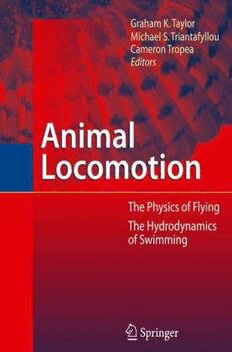
Animal Locomotion PDF
454 Pages·2010·65.984 MB·English
Most books are stored in the elastic cloud where traffic is expensive. For this reason, we have a limit on daily download.
Preview Animal Locomotion
Description:
The physical principles of swimming and flying in animals are intriguingly different from those of ships and airplanes. The study of animal locomotion therefore holds a special place not only at the frontiers of pure fluid dynamics research, but also in the applied field of biomimetics, which aims to emulate salient aspects of the performance and function of living organisms. For example, fluid dynamic loads are so significant for swimming fish that they are expected to have developed efficient flow control procedures through the evolutionary process of adaptation by natural selection, which might in turn be applied to the design of robotic swimmers. And yet, sharply contrasting views as to the energetic efficiency of oscillatory propulsion – especially for marine animals – demand a careful assessment of the forces and energy expended at realistic Reynolds numbers. For this and many other research questions, an experimental approach is often the most appropriate methodology. This holds as much for flying animals as it does for swimming ones, and similar experimental challenges apply – studying tethered as opposed to free locomotion, or studying the flow around robotic models as opposed to real animals. This book provides a wide-ranging snapshot of the state-of-the-art in experimental research on the physics of swimming and flying animals. The resulting picture reflects not only upon the questions that are of interest in current pure and applied research, but also upon the experimental techniques that are available to answer them.
See more
The list of books you might like
Most books are stored in the elastic cloud where traffic is expensive. For this reason, we have a limit on daily download.
